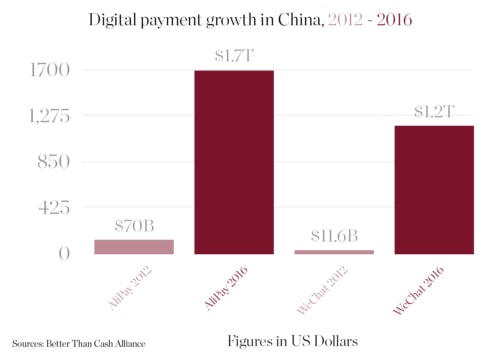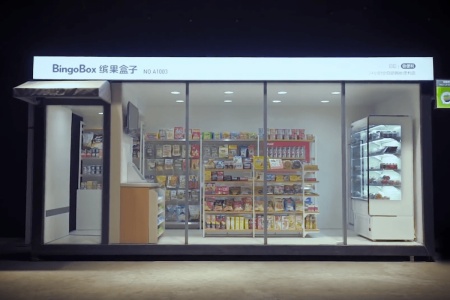China’s Store of the Future Has No Checkout, No Cash and No Staff
SHANGHAI, China — High-tech automated convenience stores are infiltrating Beijing and Shanghai. One of them, BingoBox, launched in several neighbourhoods early this month, offering shelves lined with instant noodles, beer and traditional snacks. Inside there is also a microwave, a shared mobile phone charger, a freezer and a soy milk machine. But one thing is noticeably missing — the staff.
The convenience store, powered by WeChat, requires no checkout, no cash and no salespeople. Customers scan QR codes to enter the store and select products, and then pay using their mobile WeChat wallets. Sensors on the shelves detect the removal of items. Once an item has been removed, it is linked to the shopper’s unique ID in the smartphone app to prevent theft.
The government also requires “real name” registration for social media users, which helps to prevent fraud, while aiding the collection of valuable consumer data. After the shopper has completed payment, any information collected at the door is automatically deleted. Bingobox, the brainchild of Swedish start-up Wheelys, currently has a dozen unmanned shops in operation in China, and hundreds more planned.
BingoBox isn’t the first staff-less store to be introduced. Earlier this month, Alibaba launched Tao Café, its first cashier-less cafe, in Hangzhou, the capital of east China’s Zhejiang province, drawing queues of customers on the opening weekend. To enter and make a purchase, shoppers required only a smartphone with Alibaba’s Taobao e-commerce app. The café uses facial and voice recognition systems to track purchases, and the system is able to automatically generate bills as soon as customers pass through a gate that can identify them with biometric technology.
The rapid roll out of cash and staff-free stores in China has been made possible by the widespread use of mobile payments, which were 50 times greater in China than those in the US in 2016, according to market data. A recent report released by the UN’s Better Than Cash Alliance said that Chinese consumers processed a total of $3 trillion in transactions through Alipay and WeChat payment, up from about $81.6 billion in 2012.

China is systematically and rapidly doing away with paper money and coins, and people in major Chinese cities are using their smartphones to pay for just about everything — to pay rent, buy groceries, donate to charity, install payments for sexual services, and more. Even buskers playing on the streets of a number of Chinese cities have put up boards with QR codes, so that passers-by can easily transfer them tips directly.
However, the implementations of these shops during the height of the summer heat hasn’t been without problems. With temperatures reaching over 40 degrees across China, several no-staff stores have had to close down, triggering debate around the buzz of these new retail formats. The question now on many people’s lips is whether the concept can work in the wider world beyond China? And can it work for fashion? Will we soon be able to pick up new clothes and walk out the store, automatically paying for them with our biometric information, without any human interaction?
The Amazon Go store, which currently has one location in Seattle, Washington inside the company’s headquarters, was initially slated to open to the public in early 2017. But this has not been the case; the store’s technology has reportedly experienced glitches when too many people are in the store at once.
Zara has introduced self-checkout stations at a new 65,000-square-foot store in Madrid, its largest store in the world, which opened in April this year. The brand, which could not be reached for comment, has yet to confirm whether these developments will roll out at other locations.
In the luxury space, department stores Harrods, Selfridges and Galeries Lafayette began offering Alipay in 2016 and are among the first retailers to do so. But selling luxury brands is an entirely different proposition than high street fashion. Staff-less stores would seem counter to the very business model that anchors luxury with the highest levels of customer service.
“I always say ‘fashion isn’t downloadable’. You need the human element — a program or piece of technology won’t provide the full level of care, attention and assistance that a shop assistant or customer service team will give. This interaction and engagement is an essential component of providing a luxury experience,” José Neves, founder and chief executive of online marketplace Farfetch, recently told the Guardian. “On the other hand, you can’t ignore technology. To succeed we need to strike a balance between the online and offline experience.”
Source: Business of Fashion




